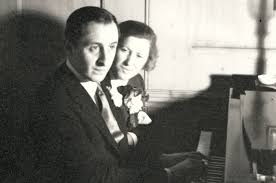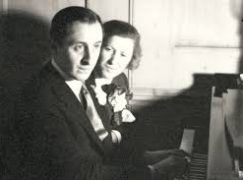Gay pianists: can you tell?
mainNot our title.
It’s a meditation in Stephen Hough’s new book, Rough Ideas: Reflections on Music and More, out this week from Faber.
Stephen writes: Vladimir Horowitz once said that there were three types of pianist: Jewish, gay and bad. Actually, I have known some that were all three, and instantly a plethora of those who fulfil none of these categories spring to mind, but is there something that makes Horowitz, Sviatoslav Richter and (Shura) Cherkassky (to choose three completely contrasting artists) different from, say, Artur Rubinstein, Emil Gilels and Rudolf Serkin?…
You’ll have to buy the book to read more.







I have often noticed a greater inclination to more sensuous, delicate music such as Ravel among gay pianists, but certainly not all.
Ravel was not gay, just a “célibataire endurci” .He would spend time with female “friends”. Poulenc was.
Oh, Prunella.
I doubt if I’ll be buying this book.
Stephen Hough should practice a little more piano instead of writing about gays, Jews, straight and others.
If there is anybody who can detect a scintilla of personality in this nondescript pianist? His recordings can be spliced with dozens of competitions winners – I bet nobody would find the chunk recorded by Stephen Hough!! Do your thing and try to do it well!
An incredible album is “The Piano Album”—some of the most distinctive and daring and colorful playing I’ve ever heard.
Stephen Hough is a wonderful pianist, but if he doesn’t do it for you, for whatever reason, there are plenty of others to listen to. Let’s not denigrate those who aren’t our ‘favourites’ though. As well as being a fine player, Hough also seems to be one of the most friendly and approachable musicians out there, and gives great interviews. As for having time to write – of course he has time, think how much of his life is lived on planes, in airport lounges, or alone in hotels.
He also composes very nondescript music, probably also written on a plane.
It’s like to say that women don’t play like men. It’s just BS. I wonder when we will get rid of all those preconceptions ? Good point for Stephen Hough.
“….is there something that makes Horowitz, Sviatoslav Richer and (Shura) Cherkassky (to choose three completely contrasting artists) different from, say Artur Rubinstein, Emil Gilels and Rudolf Serkin?”
Stephen Hough actually wrote this nonsense?
Wow.
(And BTW, Stephen, It’s spelled Arthur, according to the pianist himself.)
In Rubinstein’s memoir he mentions cheerfully changing the spelling of his first name according to whatever country he happened to be in: Artur, Arturo, Arthur. Artur is the spelling he was born with. I doubt he would care much how anyone spells it.
Well, Sviatoslov also spelled his last name with a t: Richter, not Richer.
While criticizing someone else for misspelling his last name, you misspelled his first.
What a complex subject. We might ask the same of composers, instrumentalists and singers. Sticking to pianists, I think the important innate qualities are a good balance of female and male traits. Horowitz said that he saw clear elements of both in the Chopin mazurkas – and that should be clear to most listeners. He played the ‘female’ bits more freely than the ‘male’ bits. Perhaps bisexual pianists would be the best. Seriously, I don’t think one’s sexuality makes a difference. What makes the difference between the run of the mill assembly line pianists and the special ones are a combination of qualities.
In Horowitz’s case, his pedalling, control of colours, shades, nuances, dynamics, his flexibility in melody and rhythm together with other innate qualities made him outstanding. When I was a teenager and having the usual trouble at school (‘you play the piano, shouldn’t you be wearing a dress?’ etc) I heard a teacher say that music doesn’t make one gay, but that gay people are drawn to music.
I have a classic Rolls Royce Phantom and discovered that an extraordinary number of fellow enthusiasts are gay. Another interest is gardening and plants. Here I found the same among collectors. I also collect antiques. Again I found the same. And the arts – acting, directing, music – well, no one will dispute that there are more gays there than in, say, plumbing or the radiator business.
Horowitz, Richter and Cherkassky, as noted, were very different pianists, as is Stephen Hough. If we add, say, Gould, Serkin, Michelangeli and Cziffra, also exceptional in their ways, I think the answer is no, sexuality doesn’t matter. What matters is a combination of qualities.
To my mind, most of today’s hyped names are exceptional only in the amount of music they traverse with hardly any wrong notes. They excel in the mechanics of playing. This is not true technique.Their playing is not exceptional in the sense of most of the other names mentioned herein. It does nothing for me.
“a good balance of female and male traits”
Oh dear, dividing a person up into “female traits” and “male traits”.
It’s like when someone who’s read almost a whole chapter of How To Be A Counsellor In Three Days starts wittering on about how men need to show “their feminine side”. Whatever feelings a man displays, they’re merely his, part of him; he doesn’t have them by a franchise agreement with the Eternal Feminine.
Can we stop this stereotyping nonsense?
You and fourteen others need to read up on neurology. And incidentally, your manner of dissent betrays a feminine trait.
We had a very attractive plumber here the other day who said he was very frustrated that nobody believed he was gay. I didn’t buy it either but I was unsuccessful in getting him to join me in the cellar to listen to some Boulez.
Sally
I haven’t seen the book, but Hough is an excellent soloist, as well as being very friendly and approachable. His interpretations have made me enjoy pieces I thought I didn’t like.
That was a provocative statement of Vladimir Horowitz, proposedly ‘scandalous’ at its time (surely done with the purpose to triggering a sensational headline in the press, that is always good for business). However, my favorite pianists Michelangeli, Brendel, and Pollini disprove the assertion, at least concerning this humble consumer.
The book seems to be a great read (as almost all written by Mr. Hough), I think I will give it a try.
What nonsense. Please, Stephen, go practice
“You’ll have to buy the book to read more.” Or not.
Or listen to him on BBC Radio 4 at 9am this morning on the Rev Richard Cole show!
No we can’t. Neither can we tell male from female. Perhaps we can tell mature from less mature. That’s all that matters.
Maybe somebody thinks they can, but I can’t. Not while they’re playing the piano anyway.
who cares?
I wonder into which category Liszt or Rachmaninov fell? Bad, presumably. What idiocy, not worth repeating.
And what about the ladies?
Shhh. Marta Argerich and Maria João Pires, to name just two very great female pianists, are neither Jewish, nor homosexual nor bad.
Argerich/Wiki: “Her maternal grandparents were Jewish immigrants from the Russian Empire, who settled in Colonia Villa Clara in the Entre Ríos province—one of the colonies established by Baron de Hirsch and the Jewish Colonization Association.”
The obsession with sex around here is getting out of control. We have had years of how more women should be here, there and everywhere, and now that they are — whether on genuine merit or on quota-driven schemes — it is no longer a whingeing point. So now we must focus on people’s sexual orientation, in the popular term? Give it a rest, and just let the artist come through — whatever their birth drives. Just LISTEN.
I wonder if Horowitz was making the same joke that Leonard Bernstein did about New York. Something along the lines of “you have to be Jewish or gay to get a show produced in this town. Fortunately, I happen to be both.”
Good conjecture. Quotes are often taken out of context, although that’s part of their charms.
Who cares? Horowitz’ statement is several decades old and although I love him as a pianist, he was never considered an intellectuel.
Horowitz was being funny. He said several such provocative things to his wife Wanda and knew something about the piano.
I’ve liked articles by Stephen Hough and will read his new book, hear his records, and see him play when possible as I’ve done for decades, starting with “A Piano Album” with its Moszkowski and Gabrilowitsch, and then his marvelous Hummel and Mozart concerti. His first recital I heard was a tour de force alternating Chopin’s four scherzi and four ballades, with Paderewski’s rare nocturne as encore. He played it as well as Paderewski. His Chopin was in the class Moiseiwitsch and Cortot.
Hard to improve on the spelling of Richter in Cyrillic, PIXTEP. Sol Hurok clung to Artur for sake of Artoosha.
Speaking of female pianists, Elly Ney easily is the most powerful I know in Beethoven”s “Emperor” and Brahms’s second. Wanda Landowska and Argerich, Myra Hess, and Lili Kraus are among the strongest of musical minds.
Profound and weighty topic.
An example of how an amusing bon mot can easily displace reasoning, facts, and reality.
When Alexander Glazunov was director of St. Petersburg Conservatory, a tsarst functionary asked how many Jewish students were enrolled there. “We don’t keep count,” Glazunov airily dismissed him.
Incidentally, I just looked up Sviatoslav Richter and was surprised to find out that he was, in fact, not Jewish as I had always thought.
It is very difficult to be Jewish, many people try unsuccessfully, like Richter.
So the late Mr H ostantatiously proclaimed:
“Pianists are Jewish, gay or bad”
Then,
from his false premise, Chopin was gay.
However,
“From the false, anything follows” (meaning: errors).